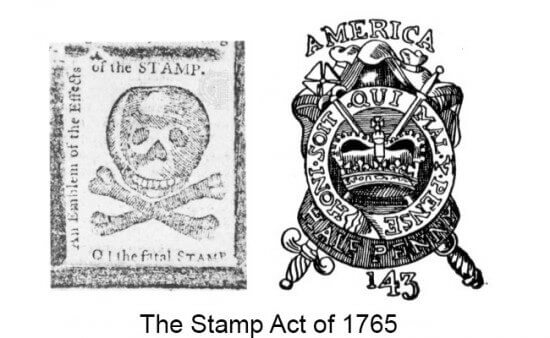When it comes to the Fourth of July and the events that led to American Independence, many of us know some of the more popular stories, such as the Boston Tea Party, the Stamp Act, and the Boston Massacre. All of these were taught to us in history classes. But what we were not taught were some of the unusual and little known events that took place that led to the American Revolution, which in turn led to American Independence.
Here are some unusual and little known events that led to American Independence.
• 1763 — Proclamation of 1763 was signed by King George III of England; this proclamation prohibited any English settlement west of the Appalachian Mountains and required any settlers who had already settled into those regions to return east. This was an attempt to ease tensions with Native Americans.
• 1764 — Sugar Act was passed by the English Parliament. It was passed to offset the war debt brought on by the French and Indian War and was also used to help pay for the expenses of running the colonies and newly acquired territories. The Sugar Act increased the duties on imported sugar and other items such as dye, wine, coffee, and textiles. It also doubled the duties on foreign goods shipped from England to the colonies and forbade the import of foreign rum and French wine.
• 1764 — Parliament passed a measure to reorganize the Americans customs system so that British trade laws could be better enforced. A court was also established in Halifax, Nova Scotia which would have jurisdiction over all American colonies for trade matters.
• 1764 — The Currency Act was passed by Parliament. The Currency Act prohibited the colonists from issuing any legal tender paper money. This act threatened to destabilize the economy of all of the colonies, so both the North and South were united against it.
• 1764 — The Quartering Act was passed by Parliament that required colonists to feed and shelter the British troops.
• 1765 — On November 1st most business and legal transactions in the colonies came to a stand still because the colonists were refusing to use the stamps that were required with the introduction of the Stamp Act. Mobs burned the royal governor in effigy, harassed British troops and looted houses in New York City.
• 1766 — The Stamp Act was repealed but Parliament instead passed the Declaratory Act that gave the British government total power to pass any laws governing the American colonies no matter what.
• 1772 — Colonists from Providence rowed out to the Gaspee, a British customs schooner; they attack the schooner, set the British crew ashore and then burnt the ship. A 500 pound reward was offered for the capture of the colonists who would then be sent to England for trial, which upset many colonists.
• 1774 — Parliament began to react to the Boston Tea Party by passing a series of acts known as Coercive Acts, which the Americans called Intolerable Acts. The first was passed in March and was called the Boston Port Bill and basically shut down all commercial shipping in Boston harbor until the taxes were paid on the tea that was dumped into the harbor. A reimbursement to the East India Company was ordered for the loss of the tea.
• 1774 — In May the Massachusetts Regulating Act and the Government Act were passed to virtually end any self-rule by the colonists. Instead, the English Crown and the Royal governor assumed all political power. The Administration of Justice Act was passed to protect all royal officials in Massachusetts from being sued in colonial courts. Also passed was the Quebec Act that established a centralized government in Canada that was controlled by the Crown and English Parliament. This act was upsetting to the American colonists because it extended the southern boundary of Canada into territories claimed by Massachusetts, Connecticut, and Virginia. All of these acts were a part of the Coercive Acts.
• 1775 — The New England Restraining Act was endorsed by King George II and it required New England colonies to trade only with England and banned fishing in the North Atlantic.
• 1775 — Governor Gage of Massachusetts was ordered to enforce the Coercive Acts and to suppress “open rebellion”? among the colonists by any force necessary.

